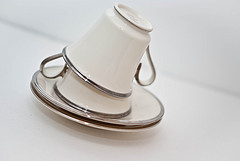Why Doesn’t The Teavana Tea I Brew At Home Taste Like It Does At The Store?
Although they might seem like free food stands to those of us roaming the grocery store or say, coffee chain, in search of a snack, any food industry business knows that setting up sample stations serves one key purposes: Get the customer hooked and get them to buy the product. But is it misleading if that taste experience isn’t replicated once you get the product home?
That was the case for the Milwaukee Journal Sentinel’s Public Investigator Gitte Laasby, who recently blogged about her experience sampling Teavana loose-leaf tea at the store. She was bowled over by the delicious blended chai oolong tea at the sampling station and was drawn inside to ask about this wondrous drink.
She knew it would be pricy, but says she was shocked at the price — loose-leaf tea there goes for about $9 an ounce and the sales rep said they don’t sell less than 2 ounces. But yet, it was so delicious…
As I hesitated, the sales rep proceeded to explain that I’d only need one teaspoon of oolong tea to brew an 8-ounce cup. She explained, as it says on the store’s website, that 2 ounces of tea will brew between 25 and 30 8-ounce cups. By that guideline, she explained, I would be paying less than $1 per cup. (I later figured that my purchase, which was $19.27 with taxes, would amount to 64-77 cents per cup.) Not bad compared to a coffee shop, right?
She was sold, and writes that she brewed her first batch the next day following the instructions she received from the rep, which were mirrored on the bag: One teaspoon for 8 ounces of boiling water, steep for 3 minutes. Alas, she was disappointed. It just didn’t taste as heavenly as the day before.
Laasby returned to the store eventually and ordered a freshly-brewed cup of the same chai she’d gone gaga for weeks earlier. She was shocked to see the barista dump in a whole lot of tea — “About six teaspoons,” he told her, explaining that they use more tea in the samples so customers can really taste it.
That’s three times as much as the instructions for brewing at home. Which means that earlier price per cup estimation no longer held — she’d pay about $1.92-$2.31 per cup instead to get the same taste on her own.
Laasby asked the company’s marketing department whether or not it was kinda maybe sorta misleading to customers to serve a sample that tastes one way at the store, and an entirely different way at home. Unless, of course, they shell out more money for more tea.
Teavana replied:
“As a standard guide, we recommend two teaspoons as the ideal strength for our teas and train our stores to use this amount as well. We also list this as a guide on our packaging for our consumers and stores as they brew a cup of tea,” she said in an email. “That said, the strength of our teas are a personal preference and can vary among individuals.”
That’s contradictory to the instructions on the bag (also seen here) unless you’re making iced tea.
In the end, she notes, it’s actually cheaper to buy a freshly-made cup at the store than bother with brewing it at home.
Teavana’s dirty secret: Why the tea you brew doesn’t taste like the store samples [Milwaukee Journal-Sentinel]
Want more consumer news? Visit our parent organization, Consumer Reports, for the latest on scams, recalls, and other consumer issues.


